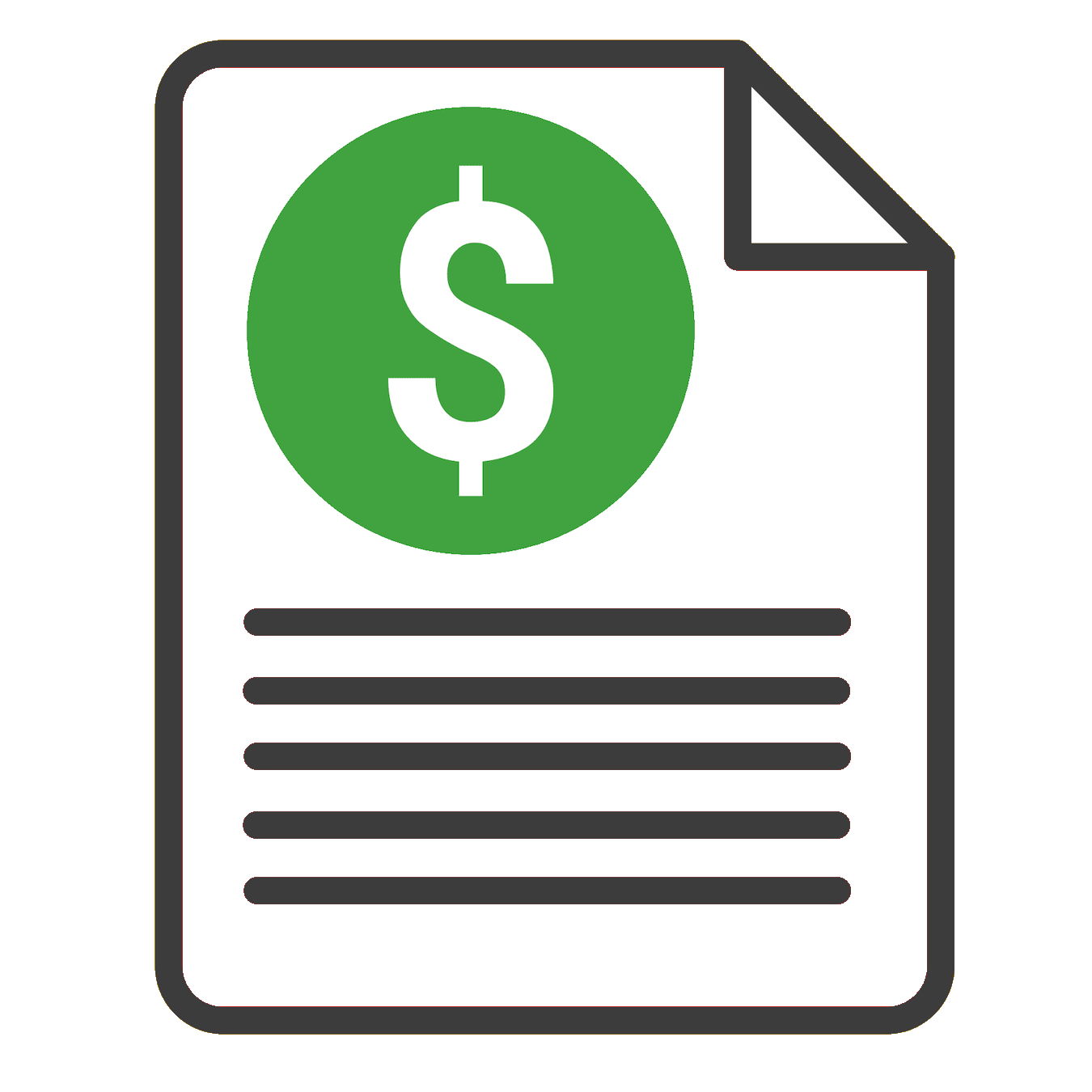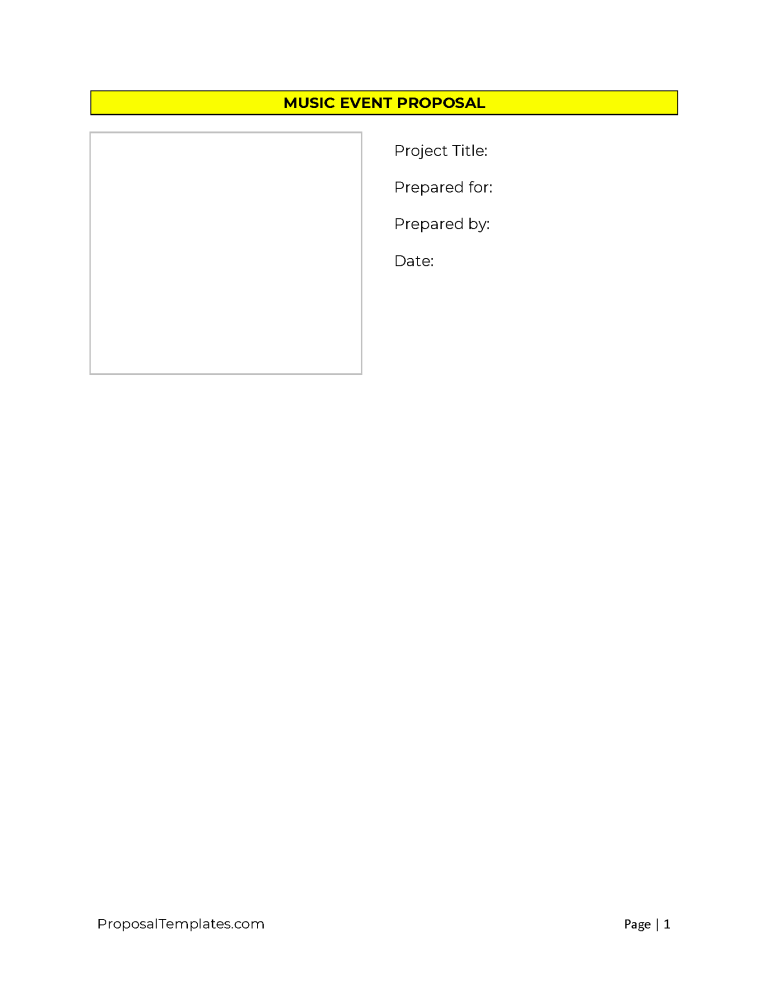Music event proposals are used to set up and promote musical concerts, festivals, and even private engagements. The purpose and performance type may vary dramatically; however, all well-written proposals present opportunities, technical requirements, projections, and logistics.
Types Of Music Event Sponsorship Proposals (11)
- Album Launch – Proposals focusing on a new music album and its promotions since this is the event objective.
- Community Concert – Proposals featuring seasonal programming and community outreach since the event is geared to a specific community.
- Concert Proposal – A proposal promoting a one-time performance, thus presenting substantial venue, logistics, and marketing plan sections.
- Fundraising Concert – A proposal promoting a nonprofit cause through a charity concert, thus discussing target audiences and engagement.
- Local Music Showcase – A proposal discussing the promotional efforts to attract audiences to local artists, especially new ones.
- Music Awards Ceremony – Proposals defining an award event’s audience engagement strategies and ceremony logistics (i.e., lighting, sound).
- Music Conference – Proposals discussing the marketing strategy used to attract enthusiasts as well as professionals to a conference.
- Music Festival – In-depth proposals discussing a music festival’s themes, audience engagement, and crucial logistics (i.e., multiple stages, vendors).
- Music Tour – This proposal presents the venue, scheduling, and a significantly detailed marketing strategy for multiple musical performances.
- Music Workshop/Masterclass – This proposal promotes the topics, curriculum, as well as goals of an educational music event.
- Outdoor Music Event – A proposal specifically discussing the permits, safety, and logistics required for outdoor performances.
1. Music Event Proposal Cover Page
Produce the event name and its essential details in an especially stylish but professional design. It is important that the cover page design conforms to the rest of the proposal.
- Music Event Title, Logo, Location/Venue
- Date/Time, Artwork, Event Hashtag
Music Event Organizer Name, Sponsor Names
- Music Event Organizer Logo, Slogan
- Copyright Information, Legal Statements
2. Title Page For Music Event
Organize information defining the proposal’s sender and recipient as well as reiterating the event’s basic information. This page should also include the sender or event planner’s logo and graphics.
- Music Event Information (Name, Location, Dates, Times)
Organizer Information (Name, Contact Details, Logo)
- Proposal Details (Title, Author, Date, Identifiers)
- Table Of Content, Visual Elements
- Copyright And Legal Information
3. Music Event Proposal Table Of Contents
Produce a listing of the proposals section together with the proposal page numbers where these topics are found. This adds to the proposal’s professionalism while making its navigation convenient.
- Proposal Title, Event Overview
- Executive Summary, Overview/Summary
- Sponsorships (Benefits, Opportunities)
- Event Details, Target Audience, Marketing, Finances
- Customizations, Timeline, Contact Material, Appendix
4. Executive Summary Of Music Event Proposal
Compose a general summary of the proposal but promote its highlights. For instance, discuss the attractiveness of the venue, the audience reach of the performers, and the benefits to the client.
- Introduction, Event Summary, Organizer Information
- Sponsorship Opportunities, Financial Information
- Target Audience, Past Successes, Testimonials
- Promotion, Exposure, Sponsor Or Recipient Incentives
- Contact Information, Call To Action
5. Music Event Introduction
When introducing it to the client, bring the music event details, history, and objectives together in a particularly flattering light. Also, contextualize the impacts of the event and its potential benefits to the proposal recipient or client.
- Professional Positive Greeting, Introduction To Organizer
- Organizer Background, Contact Material, Social Media
- Target Demographic, Audience Reach
- Event Theme, Significance, Mission, Objective
- Sponsorship Discussion/Invitation, CTA (Call To Action)
6. Music Event Overview
Present the event specifics in detail. In other words, document everything from its audience size to its location.
- Event Name (Dates, Venue/Location, History/Background)
- Mission, Purpose, Objective, Anticipated Impacts, Attendee Profile
- Marketing Promotions Strategy, Advertising Opportunities
- Logistics, Equipment, Vendors, Audience Engagement
- Itinerary, Flow Of Events, Safety, Organizer Contact, CTA
7. Music Performers
Identify every performer slated for the music performance together with their backgrounds. Also, discuss each one’s biography, genre, and event contributions (i.e., fan base demographics).
- Artist Lineup, Main Attraction, Openers
- Artist Biography, Performance Logistics
- Special Appearances, Performance Highlights
- Contingeny Plans, A/V (Audio/Video) Support
- Performer Appeal, Commitment, Audience Engagement
8. Program, Setlist, Event Flow
Present the music event’s itinerary in detail. That is, provide the schedule for the performances and activities during the music event.
- Event Schedule Or Itinerary, Performance Sequence
- Setlist, Program Specifics, Intermissions, Performance Times
- Speakers, DJ’s, Announcers, Stage Transitions, Visual Effects
- Special Appearances, Collaboration, Technical Requirements
- Highlights, Performer Reach, Audience Engagement
9. Technical Needs And Venue
Describe the event venue’s location, capacity, facilities, and technical requirements for sound, lighting, and stage setup. Additionally, provide details on the contingencies that will be followed should technical challenges occur.
- Sound System (Microphones, Speakers, Amplifiers, Consoles)
- Stage Setup: (Design, Platforms, Risers, Size, Dimensions)
- Intrument Requirements, Power Needs (Outlets, Voltage)
- Backline Equipment, Sound Engineers, Technical Support
- Streaming, Rehearsals, Cabling/Connectivity, Special Effect
10. Music Event Marketing
Reveal the marketing strategies so the recipient is aware of the promotional opportunities. For example, document all relevant event partnerships with media outlets, press releases, and social media campaigns.
- Target Audience (Age/Gender, Interests, Economic Status, Location)
- Marketing Objectives, Event Branding, Advertising Budget
- Promotional Channels (Social Media/Email Campaign, T.V., Radio, Print)
- Public Relations, Partnerships, Sponsors
- Audience Engagement/Interaction
11. Music Event Budget, Expenses, Finances
Explain the musical event’s income sources, expenses, as well as its overall financial plan. Specifically, define the music events’ total costs, the proposal recipient’s responsibilities, and the benefits they may expect.
- Artist Fees, Venue Rentals, Production Costs, Profits/Losses
- Marketing, Promotion, Staff, Personnel, Budget Summary
- Insurance, Licensing, Permits, Cash Flow Projections
- Concessions, Catering, Security, Safety, Assumptions
- Contingency Funds, Miscellaneous Expenses, Compliance
12. Sponsorship
If the proposal recipient is sought for sponsorship rather than as a client, then directly address this topic. That is, explain the benefits and responsibilities of each sponsorship package in this proposal during the ask.
- Sponsorship Levels, Benefits, Pricing
- Brand Exposure, Placement, Promotions, ROI
- Audience Relevance, Previous Success Stories
- Sponsorship Application, Agreement
- Legal Terms, Supporting Documents
13. Audience Engagement
Put together a presentation defining the techniques and strategies for audience interaction and involvement, such as contests or prizes. Also, if relevant, explain the positive impact such a level of audience attention will have on the proposal recipient.
- Audience Profiling, Interactive Activities
- Engagement Zones, VIP Areas, Accessibility
- Entertainment Lineup, Social Media Engagement
- Food/Beverages Options, Merchandising, Post-Event Areas
- Crowd Engagement, Souvenirs, Safety, Timing
14. Logistics And Operations
Layout the logistics for the music event, such as transportation, security, and regulatory compliance. Assure the recipient that contingency plans will be in place even if a risk to the music event is realized.
- Venue, Site Plan, Transportation, Wayfinding, Signage
- Load-Ins, Load-Outs, Vendor Management, Concessions
- Technical Equipment, Security, Waste Management
- Safety, Accommodations, Registration, Ticketing
- Permits, Licenses, Communication Infrastructure
15. Technical Production
Lay out all the technical requirements for the music event, specifically detailing the necessary logistics. For example, define the sound equipment, setup, insurance, and backup equipment, as well as transportation.
- Stage Setup, Sound System, Lighting Setup
- Instrument Requirements, Technical Crew, Budget
- Backline Equipment, Sound Checks, Technical Support
- Technical Rider, Cabling, Connectivity, Safety Measures
- Special Effects, Recording, Streaming, Electrical Needs
16. Safety And Emergency Contingency Plans
Present the emergency plans, safety measures, and municipal requirements for these factors. Also, include an extensive discussion on how the venue will meet these requirements.
- Event Security Plan, Security Personnel, VIP/Artist Security
- Baggage, Item Checks, Access Control, Security Monitoring
- First-Aid, Medical Stations, Emergency Response Plan, Budget
- Communication Systems, Crowd Control, Weather Contingencies
- Lost and Found, Fire Safety, Alcohol Substance Abuse Control
17. Calendar And Itinerary
Fully define the schedule for the music event, especially its preparation (i.e., permits, transportation) and breakdowns. Also, mark the musical event’s milestone dates and the proposal’s recipient.
- Event Dates, Event Times, Marketing Schedule
- Pre-Event Planning, Promotions, Registration
- Ticket Sales, Setup, Breaks, Event Activities, Milestones
- Guest Arrival, Volunteer Assignments, Emergency Response
- Security, Safety Measures, Closures, Post-Event Activities
18. Registration, Ticketing, Admissions
Explain how the attendees will be incentivized to attend the event (i.e., promotions, discounts) and the registration options available. It is equally important to describe their requirements to attend, such as the ticket purchase process.
- Registration Process, Online Ticketing Platforms, Timeline
- Ticket Sales, Ticket Types, Pricing, Group Rates, Scalping Prevention
- Early Bird Promotions, Payment Methods, Scalability, Sponsors
- Ticket Delivery, Access, Refunds, Cancellation Policies, Revenue
- Customer Support, Will-Call, Box Office, Capacity Limitations
19. Accessibility
Discuss how the event and the venue have set up access to the performance and seating area for those with mobility considerations (i.e., wheelchairs). Also, mark these accessibility areas on the floor plans of the event and additional venue areas.
- Legal Compliance, Venue Accessibility, Facility Schematics
- Transportation, Parking, Assistive Services, Accessibility Budget
- Accessible Seating, Accessible Restrooms, Special Accommodations
- Information Access, Service Animals, Attendee Communication
- Accessibility Training, Emergency Evacuation, Inclusivity Initiatives
20. Environmental Impacts
If the recipient is an ecologically conscious client or sponsor, then discuss the environmental practices in place. This section would be especially relevant if the music event theme or objective is aligned with sustainability and ecological consciousness.
- Energy Efficiency, Water Conservation, Carbon Offset Programs
Recycling, Waste Management, Sustainability Budget
- Eco-friendly Transportation, Carbon Reduction Strategies
- Environmental Reporting, Eco-friendly Products, Waste Reduction
Environmental Certifications, Education, Green Partnerships
21. Assessments, Evaluation, And Success Metrics
Explain to the recipient how the music event will be evaluated using past events and projections(i.e., audience attendance). Regardless of whether the recipient is a client or sponsor, the event’s key performance indicators will likely impact their response.
- Ticket Sales, Attendance, Financial Goals, Sponsorship, Media
- Press Partnerships, Audience Engagement, Ticketing Metrics
- Performer Success, Community Engagement, Customer Satisfaction
- Safety, Security, KPIs, Environmental Impact, Social Responsibility
- Inclusivity, Accessibility, Return On Investment (ROI), Post-Event Surveys
22. Call To Action Conclusion
Reiterate every positive point of the proposal, then conclude it with an optimistic note. It is important that the client or sponsor feels welcome to answer this proposal, even if only to make further inquiries.
- Key Points Summary, Alignment Emphasis
- Expressions (Enthusiasm, Gratitude Encouragement)
- Response Invitation, Call to Action
- Closing Remarks, Appendices
- Attachment Reminders, Signature
23. Appendices
Organize a final section with any bulky items referred to above so that the recipient can read through the proposal quickly. If needed, ensure the appendix items are cited in the proposal above.
- Financial Documents, Press Coverage, Success Stories
- Event Floor Plans, Sponsorship Packages, Media
- Sample Contracts, Artist/Performer Information
- Letters of Endorsement, Venue Agreements, Technical Specs
- Marketing Materials, Event Schedule, Environmental Reports

